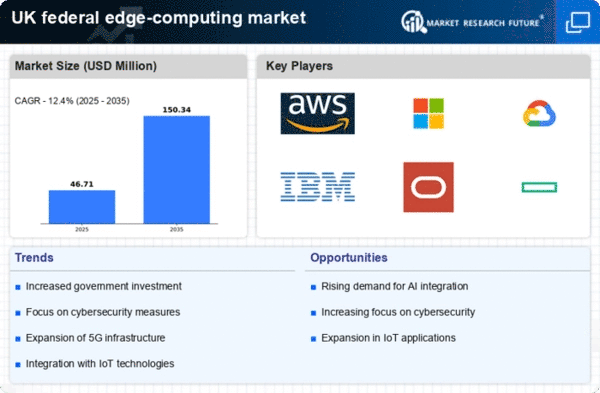Increased Focus on Cybersecurity Measures
The heightened focus on cybersecurity measures is a crucial driver in the federal edge-computing market. As cyber threats evolve, UK government agencies are prioritizing the protection of sensitive information. Edge computing offers enhanced security features by processing data closer to its source, thereby reducing the risk of data breaches during transmission. The federal edge-computing market is projected to grow as agencies implement advanced security protocols that leverage edge technologies. This shift is particularly relevant in sectors such as healthcare and finance, where data integrity is paramount. By investing in edge computing solutions, agencies can bolster their cybersecurity posture while ensuring compliance with national security standards. Consequently, the emphasis on cybersecurity is likely to propel the growth of the federal edge-computing market.
Regulatory Compliance and Data Sovereignty
Regulatory compliance and data sovereignty are significant drivers in the federal edge-computing market. UK government agencies are under pressure to adhere to stringent data protection regulations, such as the Data Protection Act and GDPR. These regulations necessitate that sensitive data remains within national borders, which edge computing can facilitate by processing data locally. The federal edge-computing market is expected to benefit from this trend, as agencies seek solutions that ensure compliance while optimizing data management. The market's growth is indicative of a broader shift towards localized data processing, which not only addresses regulatory concerns but also enhances data security. As agencies navigate the complexities of compliance, the demand for edge computing solutions that align with legal requirements is likely to increase.
Enhanced Network Reliability and Performance
Network reliability and performance are increasingly critical in the federal edge-computing market. With the rise of remote operations and the need for uninterrupted service, UK government entities are investing in edge computing solutions that enhance connectivity and reduce latency. The market is projected to grow at a CAGR of 25% over the next five years, driven by the necessity for robust network infrastructures. Edge computing allows data to be processed closer to the source, minimizing delays and ensuring that critical applications remain operational even during network disruptions. This focus on reliability is particularly relevant for sectors such as defense and public safety, where consistent performance is non-negotiable. As a result, the federal edge-computing market is likely to see increased investments aimed at bolstering network capabilities.
Growing Demand for Real-Time Data Processing
The increasing need for real-time data processing is a pivotal driver in the federal edge-computing market. As government agencies in the UK seek to enhance operational efficiency, the ability to process data at the edge becomes crucial. This demand is reflected in the projected growth of the market, which is expected to reach £1.5 billion by 2026. Real-time analytics enable agencies to make informed decisions swiftly, thereby improving service delivery. Furthermore, the integration of edge computing with IoT devices facilitates immediate data collection and analysis, which is essential for applications such as surveillance and emergency response. Consequently, the federal edge-computing market is likely to expand as agencies prioritize technologies that support rapid data processing capabilities.
Advancements in AI and Machine Learning Integration
Advancements in AI and machine learning integration are driving innovation within the federal edge-computing market. The ability to deploy AI algorithms at the edge allows for more efficient data processing and analysis, which is essential for applications such as predictive maintenance and anomaly detection. UK government agencies are increasingly recognizing the potential of these technologies to enhance decision-making processes. The federal edge-computing market is expected to expand as agencies adopt AI-driven solutions that improve operational efficiency and service delivery. This trend is indicative of a broader movement towards intelligent systems that can adapt to changing conditions in real-time. As AI and machine learning continue to evolve, their integration into edge computing is likely to reshape the landscape of the federal edge-computing market.
















